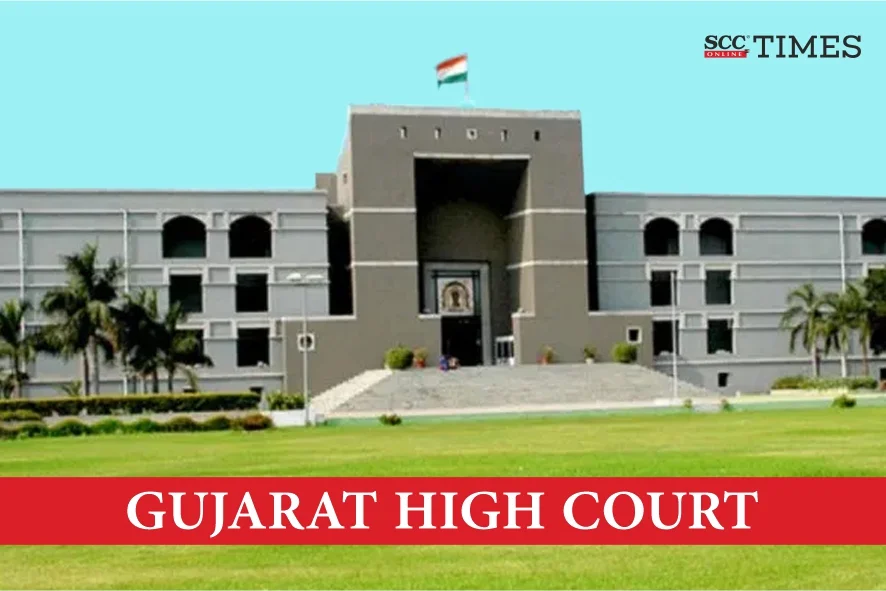Gujarat High Court: In an appeal filed under Section 173 of the Motor Vehicles Act, 1988 (‘MV Act’) against the judgment and award passed by the Motor Accident Claims Tribunal (‘the Tribunal’), a Single Judge Bench of J.C. Doshi, J., allowed the appeal holding that the Tribunal took a hyper-technical view, which was insensitive, despite there being sufficient evidence against the accused. The Court directed the Tribunal to hear the matter afresh on merits.
Background
On the day of the incident, the deceased was walking on the Jetpur Dhoraji Road when respondent 1 drove his bike in rash, reckless, and negligent manner and hit the deceased, resulting in gross injuries that led to his death. The deceased was a young and healthy farmer and an agricultural labour, with an income of Rs. 25,000 per month. Hence, for loss of future income (including future prospects), consortium, loss of estate, funeral, and other miscellaneous expenses, the appellants sought compensation of Rs. 30 Lakhs along with interest from respondents, jointly and severally before the Tribunal. However, the appellants were aggrieved by the impugned judgment and award passed by the Tribunal and hence, filed the present appeal.
Analysis
The Court noted that the eyewitness categorically denied the non-involvement of the motorcycle in the road accident as well as the allegation that she told the hospital that the deceased was hit by a four-wheeler. The FIR also levelled a clear allegation of rash and negligent driving against the accused. Other police evidence also corroborated rash and negligent driving by respondent 1. Additionally, in his written statement, respondent 1 accepted the occurrence of the accident. The Court stated that all the evidence was overwhelmingly sufficient to prove that on the day of the incident, the deceased was hit by respondent 1.
The Court remarked that it was very unfortunate that the Tribunal, instead of taking a holistic view, tried to find small inconsistencies in the evidence to throw out the claim of the appellants. The Court further remarked, “The Tribunal, instead of believing on the testimony of the eye witness and police records, believed the deposition of two medical officers and more particularly, case history recorded by the medical officer given by some third party about the road accident and believed that since according to them, the incident took place due to four-wheeler, involvement of the motorcycle in the road accident was doubtful, rather it was implanted.”
The Court stated that such an approach of the Tribunal would’ve been wise had it been a criminal case, whereby the nature of the evidence was required to be beyond reasonable doubt. However, the Tribunal’s approach ought to have aligned with Section 167 of the MV Act for granting just and fair compensation to the victim of the road accident. Hence, the Court stated that the Tribunal’s approach was hyper-technical, which was insensitive.
The Court added that it failed to understand how this kind of approach was taken by the Tribunal, despite there being sufficient evidence. The FIR and charge sheet were also not challenged by either respondent 1, or the insurance company.
The Court noted that the insurance company, who was relying upon the evidence of the aforementioned medical officers who stated that a four-wheeler was involved in the accident, did not provide evidence to establish its contention. As per the Evidence Act, 1872, first, the insurance company was required to enter into the witness box to establish its contention and then lead necessary evidence in support of its contention. The Court further noted that the insurance company did not rely on the witness, led by them, who deposed in favour of the appellants.
The Court held that, all in all, what could be held was that the Tribunal had ignored the very purport and object of the MV Act to grant just and fair compensation. The Court stated, “adopting a sensitive approach is crucial for the Tribunal. It plays a key and vital role in ensuring not only justice to the victim of the motor accident but also to determine just and fair compensation. The Tribunal is expected to have empathy and to prevent subsequent trauma by taking a sensitive approach to feeling the pain of the victim of the road accident because the victim of the road accident and their family often deal with physical and emotional trauma and an empathetic approach can provide them a sense of support and understanding, which may nurse the pain of the victim and put them back to the pre-accident stage at least. Moreover, a compensating approach can prevent the effect of emotional stress that might arise from the adversarial legal process.” The Tribunal was entrusted with summary jurisdiction to decide the issue, keeping in mind the principle of paying just and fair compensation under Section 168 of the MV Act, as ultimately, the goal of the Tribunal was to deliver justice.
Holding the above, the Court allowed the appeal and quashed the impugned judgment, thereby restoring the case to its original proceedings. The Court also directed the Tribunal to decide the petition on merits without being influenced by the impugned judgment as early as possible.
[Anishaben Sharifbhai Solanki v. Sachinbhai Bharatbhai Suvagiya, 2025 SCC OnLine Guj 664, decided on 14-02-2025]
Advocates who appeared in this case :
For the appellants: Monal S Chaglani
For the defendants: Harivadan Patel, Raj M Thakkar, and Kirti S Pathak






